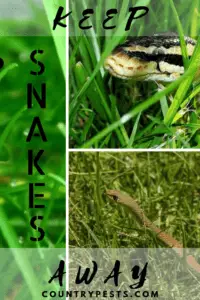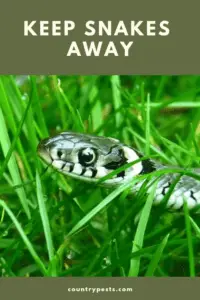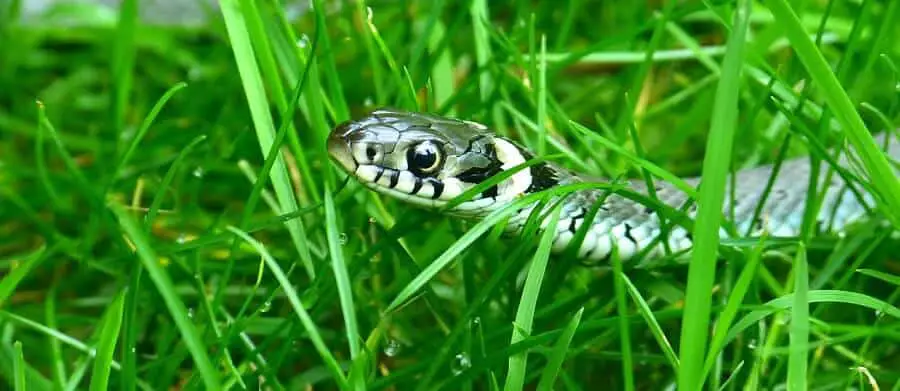Most people either hate snakes or love them. My daughter is terrified of them and scared that she will encounter a snake in the backyard. Most snakes are not poisonous, but that doesn’t mean you want them in your yard. Did you know there are several effective steps you can take to keep snakes at bay?
How To Keep Snakes Off Your Property. The best way to keep snakes off your property is to create a habitat that doesn’t invite them and doesn’t appeal to them. You should eliminate food sources for the snakes, their hiding places, and watering spots.
You may not be aware of all the things that attract snakes, so let’s dive into specific areas that you should monitor.
1. Mow your lawn
Snakes are attracted to a long lawn for many reasons. First, grass attracts rodents, insects, and small animals. An overgrown lawn becomes its own ecosystem full of grasshoppers, spiders, reptiles, birds, worms, mice and voles. All of these things are food for snakes. Snakes follow their food source and will be attracted to long grass. Short grass will not attract animals and insects, although it doesn’t completely eliminate them.
Secondly, grass provides cover or camouflage for snakes. Snakes are prey to many other animals including hawks, owls, and even cats. A snake that crawls through a short lawn is at a greater risk than a snake in long grass. This will mean that even if a snake moves through your lawn, it is more likely to be killed by a predator.
2. Eliminate bushy landscaping
Snakes love to hide under bushes, rocks, and branches. You can eliminate snake homes and hang-outs by eliminating bushes. Consider landscaping with trees instead of bushes. If you do have bushes, trim the branches and keep them neat.
Eliminate large rocks where snakes can hide. You can also replace wood chips and mulch for gravel landscaping around your plants. This will make the area more unpleasant to snakes to traverse and more difficult for them to slither under for cover.
3. Clear out debris piles
Snakes can hide under wood, scraps of sheet metal, among trash, or branches. If you have piles of trash, get rid of them. Clean up other items around your hard that snakes can hide in. If you have unfinished projects, put away the materials until you have time to finish the project or it may become a haven for a snake.
Be aware of fallen fruit and nuts from your trees. This keeps rodents and squirrels away.
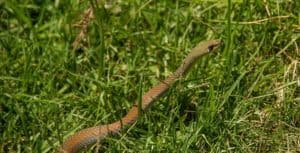
4. Raise wood piles off the ground
Snakes love to hide in wood piles. It is really hard to keep any woodpile clear of a snake because there are plenty of places to hide, the wood moderates the temperatures, and they are shaded and often damp. Additionally, wood piles usually contain spiders and rodents. All of these things combine for the perfect habitat for a snake.
You can help to stop your woodpile from becoming a snake haven by lifting it above the ground. Raise the entire woodpile up several feet. Wood should be at least 2 feed off the ground.
5. Contain compost
Put your compost in sealable containers. Compost attracts many pests. Ground compost also provides easy burrowing, available food, and moisture. This means that insects, worms, and other animals are usually attracted to compost. Rabbits, mice, and other small animals can often be found near a compost pile. When you keep your compost in containers with lids, you keep animals away and in turn, keep snakes away.
6. Seal holes, gaps, and cracks around your house and deck
Snakes can enter a home through gaps as small as ½ inches wide. This provides them with protection. Drywall is a cool, dark place and is very attractive to snakes. Holes in your foundation, gaps in your sidings, or space under your deck can all be shelters for snakes or the small animals that attract them.
You should also install screens over vents and pipe holes leading into your house. Most plumbing pipes have gaps around the pipes that will let in snakes.
7. Avoid over-watering
Don’t overwater your grass or yard. Snakes are attracted to water. Overwatering creates pools of water and wet soil that brings earthworms out, attracts insects, and brings snakes to the area. Snakes often live near rivers or streams and they love damp and cool places. Overwatering your yard can create areas under your porch, along your house, or near bushes that stay wet longer.
8. Remove their food sources
Eliminate or reduce snakes food sources as much as possible. Snakes can go weeks without eating, but they eventually have to find food. If you are having a mouse or vole problem, then take care of it. A large amount of food will attract snakes. If you eliminate the most common food sources, it will make your yard less attractive to snakes.
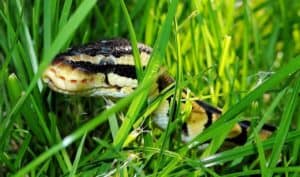
9. Move the bird feeder
Relocate the bird feeder so that you aren’t attracting snakes close to your home. Snakes are attracted to birds and to birdseed. Birds are messy when eating. Clean up spilled birdseed. Hang the bird feeder at least 4 feet away from a tree trunk to reduce snakes attacking the birdfeeder. Snakes can climb up tree trunks, especially rough wood. Yet, it is harder for many species to navigate tree branches and to drop successfully onto a bird feeder. Store bird feed in a metal can with a tight fitting lid.
10. Bring pet food inside
Fed pets indoors. This helps in not attracting snakes. Pets rarely eat pet food without crumbs and other remnants left behind. It gets tracked and makes it easy for snakes to find. Some snakes can be dangerous to your pets so feeding them inside helps to minimize the danger. This is especially true if you are fighting a big snake infestation.
11. Fix landscaping
As you add and change your landscaping, be aware of the types of landscaping that attracts snakes. Keep ponds and fish baths away from play areas occupied by children and away from the house.
Consider trees instead of bushes for landscaping purposes. Provide perching spots for hawks, owls, and other birds of prey. Inviting hawks into your yard provides a natural snake predator.
12. Use Snake-Fencing to keep snakes out
Snake fencing keeps snakes out of specific areas. It must be buried 6 inches deep at be at least 4 feet high. Snake fence doesn’t provide gaps for snakes to get through. Hardware cloth is usually used to avoid killing the snakes. Deer netting is used to capture and kill the snakes getting in.
Snake fencing is more expensive than other types of fencing so you may want to only fence off important areas. These areas include children’s play areas, chicken coops, and animal runs.
13. Snake-proof sensitive areas
Snake-proof areas where fencing is not feasible. You can do this by wrapping hardware cloth around an existing fence. Hardware cloth is strong and provides the protection to keep snakes out. Wrap the hardware cloth around fencing and secure it. You can also wrap it around your house. Leave 6 inches extra at the bottom so that it can be buried along the fenceline.
14. Let your dog play outside
Most dogs will bark and run around the yard. This helps to intimidate snakes to stay out of view and can even entice them to move on to another area.
15. Collect chicken eggs regularly
If you have chickens, then it is vital that you collect chicken eggs. Snakes love eggs and once they discover a stash, they will return regularly. If you are raising chicks and want your eggs to hatch, then make sure to protect your coop from snakes using the methods mentioned above.
Do not use fake eggs, ceramic eggs, or golf balls as decoys for snakes. This will cause the snake to die a slow and painful death and will not keep other snakes away from your chickens. Instead, take precautions to keep your chicks and eggs safe.
Do Mothballs Keep Snakes Away?
Mothballs are completely ineffective in keeping snakes away. The primary reason for this is that snakes do not smell in the same manner as humans. Snakes basically taste instead of smell. That is why their tongues flicker. Odor in the air does not affect snakes in the same manner that they affect other olfactory-based animals.
Even though mothballs smell strong and nasty to humans and other animals, they are odorless to a snake. In dozens of tests, snakes have shown no aversion to mothballs.
Mothballs are made primarily of Naphthalene, which can be harmful to pets, humans, and other animals. Therefore, using them in your yard, or against the product, recommendations can result in illness or death of other creatures.
Does Sulfur Repel Snakes?
Sulfur does not repel snakes, even though it is one of the most popular ingredients in commercial snake repellents. Sulfur has a strong odor to humans. But, it doesn’t affect snakes.
Sulfur can work its way into a snake’s scales and make them more irritable. This can make dealing with the snake more difficult.
Does Vinegar Keep Snakes Away?
Vinegar may be an effective snake repellent as long as it is still wet and has not dried. Many people claim that snakes will not crawl through vinegar and that if it is poured on concrete, it can form a snake barrier.
There are some issues to using vinegar. A lot of vinegar will need to be used and it will need to be applied often. Depending on how much vinegar you spread, you may need to reapply it every 30 minutes. If vinegar is effective, it is not because of the smell, but because snakes do not like the feel of crawling through it.
What’s The Best Way to Chase Snakes Away?
When you encounter a snake in your house or yard, there are several steps to chase it away.
- Use a hose to spray it away. Hoses allow you to stay at a distance from the snake, and will gently encourage the snake to find another place to go.
- Use a broom or rake to nudge it away. When you find a snake indoors, in a tight area or somewhere the hose isn’t feasible, use a broom or a rake to nudge or pick up the snake and move it to another area. Be gentle and make slow movements.
- Call a professional. If you are worried that the snake is poisonous or if it’s large and makes you uncomfortable, then call a professional. Snake handlers are know how to best handle a snake.
- Do not use sticky pads to keep snakes away. These harm snakes and other animals.
- Do not relocate snakes to another area. Many cities and states prohibit the relocation of snakes to other areas. You can damage an ecosystem and cause harm to others.
Related Questions
Are Snakes Poisonous? Only 1% of all snakes are poisonous. Most snakes that you will encounter are harmless and will not hurt you, even if you are bitten. However, you should never handle a wild snake unless you are an expert in snake identification. Many harmless snakes have similar markings to poisonous snakes and it can be easy to assume a snake is not poisonous. Most of the time, it is best to leave a snake alone.
What Are The Benefits Of Having Snakes In The Yard? Snakes bring many benefits to a homeowner or gardener. They prefer to eat the very animals that tend to be pests to most people including rats, mice, voles, chipmunks, and insects. They can also eat frogs, lizards and small mammals. This helps to keep your pest population under control. If you get rid of all the snakes around your property, you may see an increase in mice and voles.
Can I kill snakes on my property? Most areas forbid killing snakes indiscriminately. This is because snakes make such a vital and important contribution to the whole ecology. Additionally, killing (or attempting to kill) a snake poses a danger to you. You might succeed in only angering the snake and not damaging it. Even after death, a snake’s bite reflex is still active for several minutes.
What’s The Best Way To Trap A Snake? The most humane snake trap is the funnel trap. It allows the snake in but doesn’t let it get back out. You can trak the snake and then release it on another part of your property.
[post-carousel id=”364″]
